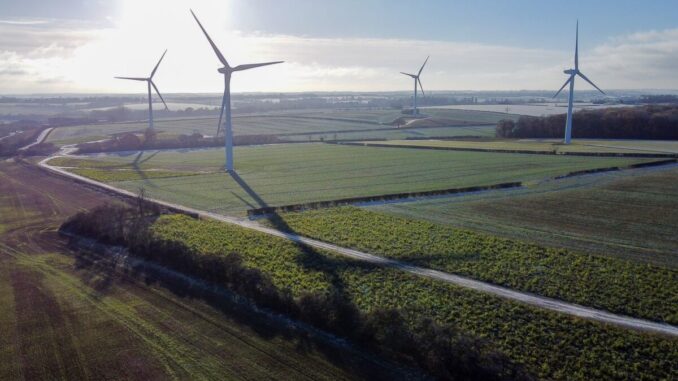
When the UK’s Climate Change Committee was formed in 2008, it augured the country’s reputation as a climate trendsetter — signaling seriousness about climate goals while also giving other nations a template for their own policies. More recently, though, the UK’s era of climate consensus seems to be shifting. Anticipating an election, the government has been backpedaling on green policies. Prime Minister Rishi Sunak approved new oil and gas licenses and pushed back the start date for a ban on fossil fuel cars.
In January, CCC Chief Executive Chris Stark said he would be stepping down after six years on the job. But Stark remains crystal clear about what the UK stands to lose if it doesn’t stick with its climate commitments. “Other countries will beat us at this if we don’t get at it,” Stark told Zero host Akshat Rathi on this week’s episode. “We cannot seem to see that it’s happening. The transition is underway, and the biggest risk to us is that we miss out.”
Rathi sat down with Stark to talk about how the UK might tell a better story when it comes to the country’s climate successes, and what his successor will need to do to steer policy in an era of growing divisions and limited consensus. Listen to the full episode and learn more about Zero here. Subscribe on Apple or Spotify to stay on top of new episodes.
Akshat Rathi 00:02
Welcome to Zero, I am Akshat Rathi.
For the past three decades, the UK has led the world in reducing emissions. It’s still true. But you might think otherwise, given the political rhetoric coming from the government in power. One big reason why the home of the Industrial Revolution has been ahead in the race to rein in emissions is the Climate Change Act of 2008.
It bound the government to carbon budgets that forced it to limit how much planet-warming emissions it can spew in any five years. Each budget is smaller, taking the government to zero emissions by 2050. Those budgets are informed by the science and overseen by the Climate Change Committee. For the past six years, the committee has been led by Chris Stark.
As the chief executive of the CCC, he’s had a delicate job to do: advising on policies that would put government back on track to meet climate goals, and admonishing the government when necessary. That job has become harder over the past year as Prime Minister Rishi Sunak has tried to backpedal on green policies.
It has empowered a partisan media to create doubts around the political consensus to act on climate change, something that has been a hallmark of UK politics for the past 15 years. Stark is stepping down from his role later this month and I wanted to hear how he has navigated the growing divisions, and what might be ahead for his successor.
That matters a lot with the UK holding an election this year that could determine whether Sunak remains in power or is replaced by a more climate-friendly government. We also talked about how the CCC has played a role outside the UK, shaping the way many governments around the world approach climate policy.
Akshat Rathi 02:18
Chris, welcome to the show.
Chris Stark 02:20
Thank you for having me, Akshat.
Akshat Rathi 02:22
Well, before we come to the net zero and the sort of phase under your leadership at the CCC, the institution itself is 16 years old. It was created as part of the UK’s Climate Change Act. And it was created at a time where all political parties came together to back the act and back the creation of the CCC. Can you just talk through what made that moment so special, given the politics of today are so much more divided?
Chris Stark 02:54
The Climate Change Act in the UK is the product of a particular period in British politics. So the act was put into law in 2008, and therefore the work on it was happening in the year prior to that. So if you cast your mind back to British politics, we had a different type of British politics at the time on climate change.
We had a feeling that the UK was in the lead, intellectually at least, on the story of climate change. And the UK put in place this piece of legislation. But the bill was supported by David Cameron’s government in preparation. There’s a few holdouts, but not many. And that led to a very strong piece of legislation, which essentially set out the idea, in a nutshell, that the government needs to act on this.
It’s their responsibility to tackle it. They need some rules to do that, but that in itself was not enough. That you needed something else to stand over that, which is the CCC, the Climate Change Committee, just to keep providing the evidence. Also give the advice on the targets. And then to check the government’s homework, essentially for Parliament.
And that model works. I think we’ve demonstrated in 16 years that it works, not least because we’ve upgraded the long-term target over the time of the act to a net-zero target from what used to be an 80% target. And that I think is a demonstration that politics also comes around eventually periodically to support that.
And I think it’s important to say that we have these moments regularly in British politics. And I’ve been in this job during one of them. You can despair when you see the politics going in a different direction, but my view generally of climate politics is that it’s a bit like a ratchet. You get periods of really, you know, increasing ambition and then it falls back a bit. But it never falls back to where you started. So I think there is an ongoing progress in climate politics that you can see playing out.
Akshat Rathi 04:43
Yeah, it was only three members of Parliament who voted against the act, more than 400 who voted for it. There were a bunch of absentees.
Now, in the creation, you got the Climate Change Committee. It’s an independent, government-funded but independent, body that has goals and policies. Eventually you provide the technical know-how of how to meet goals and then policy advice on what needs to be done. But you also act as a watchdog, just making sure that the government is actually making progress on these goals.
And the advice that you give can have big implications, right? The straightforward one is governments do what you say. But if they don’t, then nonprofits can use your advice to show governments are failing. For example, in 2022, a number of NGOs sued the UK government for not being on track to meet its climate goals.
They won the case and the government was forced to respond. What are other good examples of the impact that CCC’s work has had on the UK’s net-zero trajectory?
Chris Stark 05:46
Gosh, that’s a difficult one to answer quickly. I mean, you, you’ve raised one of them. So the watchdog rule is laid out very clearly in the act, but it’s become very important. And you’re right, the NGOs and others, civil society, uses our reports as a means to encourage more action from the government.
I think the bit that’s not so well understood is that we have this advisory role. But what’s really interesting is that, we basically, every five years, we package up the latest piece of advice. We do a fresh piece of analysis, what we call a bottom-up piece of analysis and across every bit of the economy to look at how you can decarbonize it. What’s been really interesting and, frankly, inspirational actually about the UK Act and that model is that turns out there’s a lot more going on than just a piece of analysis when you give that advice on the carbon budget.
What we’re looking at is a fundamental shift in every corner of the economy. And the private sector has a real interest in that work. And what’s happened over the 16 years of having a Climate Change Act is really interesting. It’s not what you see written in the Climate Change Act. We now do a piece of work where we’re trying to build consensus in sectors of the economy for the transition and the change that lies ahead.
And if I take one example of that, when I started in this job, we had a very difficult discussion as an institution with the aviation sector. So it’s a high-emitting sector, we don’t have the answers to how we can get to zero emissions, certainly not by 2050. And we were essentially in opposition with that sector because we were a threat.
We, in recent years, have turned that into a much more productive discussion with the aviation sector. We’re essentially saying to the aviation sector, ‘Look, here’s how we see the path ahead for aviation emissions.’ We also agree on a lot of the technologies that the aviation sector itself will deploy to make aviation more efficient.
That basically means the aviation sector, when we produce our report, will say, ‘We agree with the CCC. Now please put policy in place to support it.’ And that is a very powerful message to government. And I suppose I didn’t anticipate that when I started this job. And it’s not just in aviation. You see that in the energy sectors. You see that in the industrial sectors. You even see that in one of the hardest areas, which is buildings. There is a lot of consensus now behind the analysis that we produce. And that’s how change happens, essentially. That we’ve become much more of a change agent than I think was envisaged when the Climate Change Act was first written, but we’ve got to wear that very carefully.
We are not advocates. There is a line that we must never cross in the CCC between advice and advocacy, and one of the challenges of my job is to make sure that we’re policing that line carefully. We walk close to it, of course, but we can’t cross it.
Akshat Rathi 08:34
That’s a less appreciated advantage of having a body like the CCC, but at its core, from a public perspective, you still remain an advisor and a watchdog. And while you’re independent, even though you’re fully funded by the government, your advice and your reports on progress, on government, can ruffle a few feathers.
But in doing your job over the last six years, you’ve also lived through increased political polarization on the net zero issue, and that shows up not just in the politics, but also in the media discourse. Places like the Daily Mail has been using CCC’s advice as ‘People have to now give up meat because the CCC says so’, or the Telegraph has been trying to find emails about CCC’s bias on certain topics.
So what have you done to be able to stand your ground and continue to have that independence and credibility in this period?
Chris Stark 09:33
I feel we have a platform and that’s legitimate and that’s provided by the Climate Change Act. And the second thing is that I don’t think we should use that platform unless we’ve got analysis to support our statement.
So the temptation is to comment on everything. And you’re right to raise the newspapers in the UK particularly. We have a particular brand of newspaper, a tabloid outlook on it that leads often to a request for us to comment on literally everything. Most of my job when it comes to comms, as we call it, is saying no to things, actually.
But where we have analysis, where we have numbers, where we have a view, I also feel it’s legitimate, in fact necessary, for us to make sure that people understand that and to project that as loudly as we feel we need to. And that has taken us into different discussions, certainly in the time I’ve done this job, because prior holders of this job didn’t take that view.
And I had a chairman, Lord Deben, John Selwyn Gummer, a member of the Thatcher government, and now in the House of Lords, who really supported that view, that it was important for the Climate Change Committee to state its view where it had the analysis. Where we don’t, we’ve got to shut up. And there’s lots and lots of areas where we don’t have the supporting analysis.
And I think that often frustrates, particularly my friends in the Green Movement, that we go so far, but not quite, not as far as they might like. And I think that’s the challenge really is that our role is only going to be defensible if we stick to our knitting, as we say in Scotland, and stick to where we have the analysis.
Some of the newspapers in the UK now make me a target. It’s because I’m determined that where we’ve done the analysis, I will defend it and I’ll put it out there. And I am frustrated when there are nefarious interests who take pot shots at analysis without the same analytical basis, because I feel it’s important that we stand our ground.
Akshat Rathi 11:33
Now you do this for government, but if you look at your own work, those are very good lessons to have, which is you want to be backed by data, have clear communication, give options, give advice, and not be an advocate — very important lessons in divided times. But how effective has that strategy been, especially in the recent years, right? Even though the UK can legitimately claim that it has reduced the most emissions among large economies since 1990, the CCC has been warning the UK government for a few years now that it’s not on track to meet its end-of-decade goals. And despite those warnings, Prime Minister Rishi Sunak has approved new oil and gas licenses, delayed a ban of fossil fuel cars, and even approved a new coal mine.
So, all things said and done, the CCC provides advice and then the government doesn’t follow it. So is the era of climate consensus over? And is CCC’s credible advice now not worth what it used to be?
Chris Stark 12:41
I don’t think the era of climate consensus is over. There is always a risk that it might be soon though, and I think we’ve got to keep thinking about that.
We’ve got a general election coming up in the UK. At some point, probably this year. I don’t think climate change itself will be an electoral issue. The manner in which we approach net zero might be. And that is probably the first time that’s been the case. And I still believe there is a political consensus behind net zero and behind addressing climate change.
But I also believe that the minute that you get complacent about that, you risk losing it. And you’ve got to keep remaking the arguments for the age. So we’re in an interesting moment where I feel the narrative has shifted on net zero. And, of course, that’s a political concern, but political concerns eventually turn into concerns in the real economy, too. So we need to keep working at this. My own view on net zero is we’re probably past the point where net zero itself is enough as a reason to do something in British politics. There was a period in the early part of it where once we’d established net zero as the goal, you could simply slap net zero on a program and say, that’s why we’re doing it.
And that would be enough to earn it political support in the government, certainly within the government. So you had policies coming out of government, solely for the reason they supported net zero. And the next stage of this, I think is probably to use net zero or climate as almost a secondary concern. And get into the question of why you might want to do something else first and for there to be a benefit to net zero too.
You know, the set of issues that we face as a country when it comes to the economy are driven by the usual concerns about jobs, investment, the need to regenerate parts of the UK. You can use net zero as a way to think that through, we need jobs in places that have suffered from not having investment in industry, up and down the country outside of the southeast of England. And we need to do this for those reasons and it will help net zero. So we can look at the places in the UK where we will develop green industries, low-carbon industries. We should do it for that reason. And net zero is a secondary concern.
You can extend it further. There are people in this country, quite rightly, who worry about things like energy security. In fact, more fundamentally, the security of the country. We need to do the right things to develop an energy-secure country. And help net zero. You can extend that further. People care deeply about landscape beauty in this country, as they should. We should be developing beautiful landscapes, rewilding, supporting regenerative farming, doing all those things. and helping net zero.
One of the most interesting things I’ve done in my six years in this job was the climate assembly, which was a process, a hugely interesting process, commissioned by the select committees in the commons, six select committees in the commons, just after the net-zero target was set.
They asked the question: How can we understand what voters think? What do people in this country, citizens of the country, think about net zero? And the citizens assembly that we did on that was fascinating because we gathered together a hundred or so people of very different views, and some of them really didn’t care too much about climate action.
And in fact, we overstated that in the group that we had those views. What’s interesting is many of the people who don’t care about climate change do care about some of the other things I’ve talked about, energy security, landscape beauty, jobs. And I think we’re in a world where — the evidence was there in that assembly — that if you go hard at those topics and then tell them that this is also good for the climate, it actually increases their support for that action. So we’re missing a trick, I suppose, if we’re not speaking to people who have different values and outlooks on this.
Akshat Rathi 16:39
More from the conversation after the break.
Akshat Rathi 17:06
I actually attended one of the sessions of the assembly in February 2020, just before the Covid lockdowns began. And of course, some of that assembly then went virtual, but you’d once told me a story about Anonymous in that very assembly. What was that story?
Chris Stark 17:06
Yeah, one of the members of the assembly, we didn’t name them, but within the assembly we had, we knew who everyone was.
One of the members of the assembly wished to go unnamed even in the physical meetings and his name was Anonymous. And he was quite an interesting chap because he was definitely fearful of a lot of the things that come with net zero. Fearful of the people who might implement those things. Maybe not fearful, suspicious of the reason for all of this.
For the rest of the conversation check out Bloomberg.com HERE:



